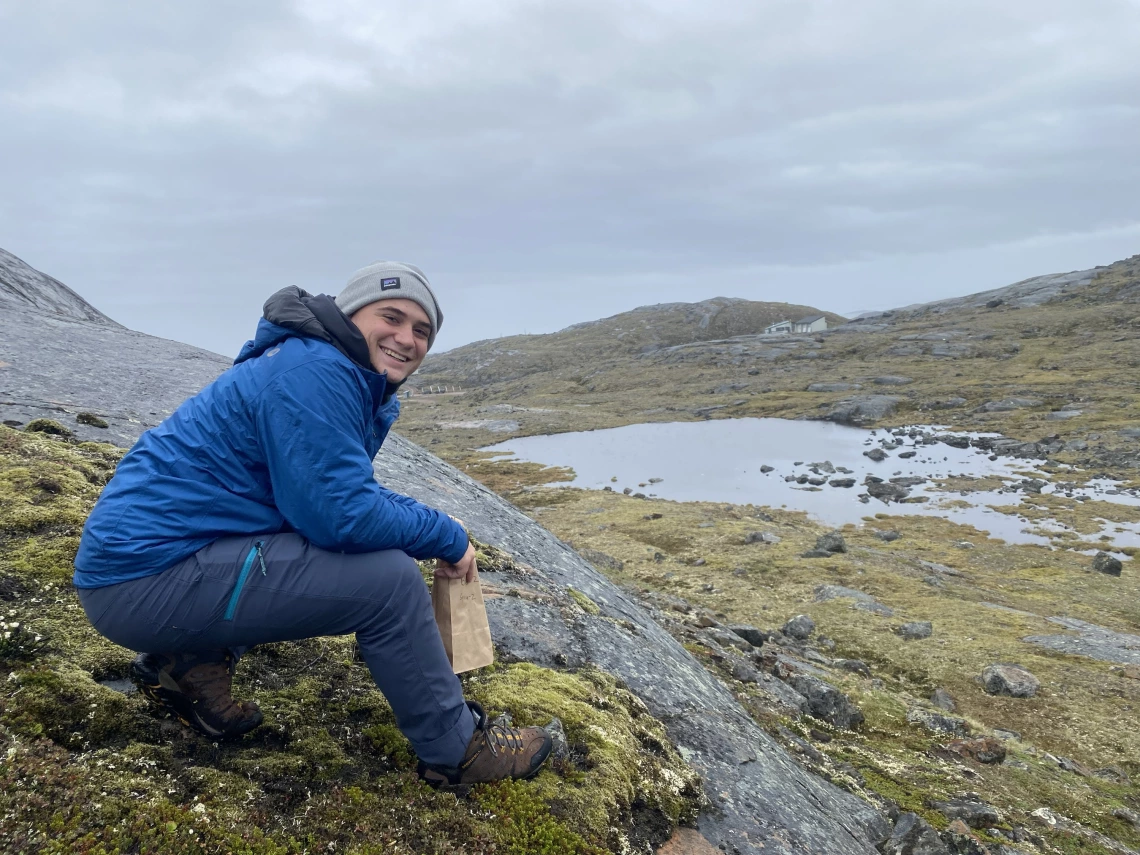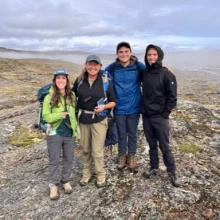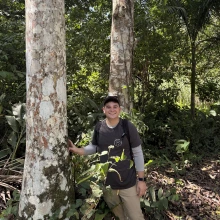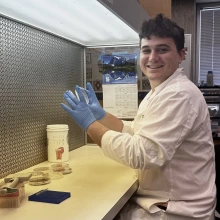An undergrad researcher’s journey from the arctic to the tropics
Student Profile: Emmett Bauer

Emmett Bauer
Most undergraduates dream of studying abroad, but few get the chance to conduct their own research in some of the most extreme ecosystems on the planet. For Emmett Bauer, a plant sciences major with a microbiology minor, his college experience has taken him from the frozen landscapes of the Arctic to the dense rainforests of Panama — all in pursuit of understanding how tiny fungi help plants survive.
A grandma’s legacy
Growing up in Syracuse, New York, Emmett spent countless hours in gardens and greenhouses with his grandmother – proud owner of hundreds of hosta plants – developing a love for plants that would shape his future.
During a family visit to Phoenix, Emmett fell in love with the unique climate in Southern Arizona -- so much so that the U of A was the only college he toured.
He initially wanted to study medicine but quickly found the plant sciences program better aligned with his passion:
"I took a few classes in plant science and was like, I want to do this for the rest of my life. I want to be in science, I want to do research. I love plants."
Now, as he plans to graduate in December, his grandma calls him for advice about her many plants.
A rare research opportunity

Emmett and the Arctic research team
Early in his first year, Emmett knew he wanted to work with Betsy Arnold, a professor in the School of Plant Sciences. He took initiative and asked if he could join her lab – a decision that would shape his entire university experience. From helping Emmett navigate grant applications to providing the opportunity to design independent research projects, Arnold has offered years of mentorship.
“She is really good at giving students opportunities,” Emmett said. “Especially at an undergraduate level.”
In the summer of 2023, Emmett was invited to join Arnold’s research team headed to the Canadian Arctic, near Baffin Island. In addition to helping Arnold’s larger research project, Emmett applied for and was awarded an NSF Research Experience for Undergraduates (REU) grant. He designed his own research project focused on how plant-fungal relationships change based on their soil.
His independent study is now being submitted for publication in Mycologia, the journal of the Mycological Society of America. Through another grant, he even had the opportunity to present his findings at the society’s annual conference in Toronto, an event that brought together top researchers from across the field.
Continuing the work

Emmett in the Panama rainforest
His Arctic research led to another opportunity – a research trip to Panama in early 2024. Funded by a U of A Honors College exploratory mini-grant, this project involved studying how different soil types affect fungal communities living inside tropical plants.
His research in Panama took place at the Smithsonian Tropical Research Institute (STRI), a world-renowned facility for tropical studies. While in the country, he also had a chance to experience the culture—visiting the Panama Canal, the coastline and Panama City.
Emmett’s work in Panama is still ongoing, and he will be returning in the summer of 2025 to continue the project. His research will also form the basis of his Honors thesis.
Community and support on campus

Emmett in the lab
On campus, Emmett previously worked for the University of Arizona Campus Arboretum, where he created plant species descriptions for the educational QR codes scattered around campus.
He was also part of the Plant Sciences Club and has been a dedicated member of Arnold’s lab, where he’s now employed. The lab has provided a community of friends and a network of peers for Emmett during his college years.
To help fund his education, Emmett earned a U of A Merit Scholarship from the university, which covers most of his tuition. He has also earned the CALES Dean’s List with Distinction and Academic Distinction.
As for coursework, Emmett enjoyed “Plant Physiology Lab” with Ravi Palanivelu and “Plant Pathology.”
When asked how the program lived up to his expectations, Emmett said, "It's been amazing. I've learned so much about plants. The professors and all the opportunities here are incredible."
Future plans: graduate school and beyond
Emmett will be graduating early, in December 2025. His ultimate goal is to remain in academia, conducting research and teaching the next generation of plant scientists. His experiences in the field – whether studying Arctic mosses, tropical fungi or desert plants – have given him a career path full of opportunity and ecological importance.
For fellow students, he has one key piece of advice: Take early initiative.
"You have to put yourself out there… Start early. -- like in your first year. Whatever you're interested in. You don't need to wait until you're at a 300-level class. If there's space, go for it. The worst they can say is no, and then you can try again.”
He also encourages students to apply for grants and research funding, even if it seems competitive. “A lot of people assume they won’t get it, so they don’t apply. But these opportunities are there, and they can change your whole college experience.”
From studying tiny Arctic plants to tropical rainforests, Emmett Bauer’s journey in plant sciences demonstrates the power of curiosity, initiative and the right mentorship. He shows that CALES undergraduates can get involved in research – even in their first year!
